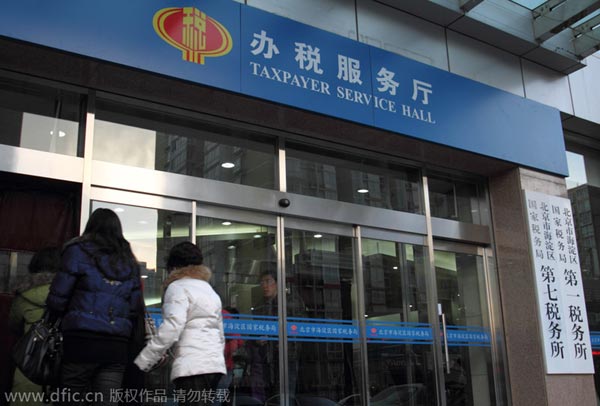China pledges stronger fiscal policy, widens tax breaks
Updated: 2015-02-26 07:31
(Xinhua)
|
||||||||
|
 |
|
People enter a taxpayer service hall in Beijing, Dec 13, 2010. [Photo/IC] |
BEIJING -- The State Council, China's cabinet, on Wednesday pledged to step up fiscal policy support and strengthen targeted controls to combat downward pressure on the economy.
"To ensure the economy operates within a reasonable range, proactive fiscal policy needs to be stronger and more effective," said a statement released after the executive meeting, which was presided over by Premier Li Keqiang.
The meeting decided to extend tax break policies to more micro and small businesses. From 2015 to the end of 2017, companies with annual taxable income under 200,000 yuan ($32,573) will have their corporate tax halved. Previously, the threshold was 100,000 yuan.
In an effort to activate private investments, the cabinet said taxes on investment earnings from non-monetary assets would be levied in stages rather than a one-off collection.
In addition, China will reduce the unemployment insurance rate to 2 percent from 3 percent previously, which is estimated to save over 40 billion yuan for businesses and employees annually.
The State Council also pledged to speed up construction of major water projects in the less developed central and western regions. Approvals on the new projects will be finished by the end of July and over 90 percent of funds from the central budget will be allocated by the end of June, according to the statement.
The set of policy adjustments comes in the wake of the economy growing by 7.4 percent in 2014, its weakest annual expansion in 24 years. A string of economic indicators, including manufacturing and trade data, all suggest continued weakness.
Data on Wednesday showed the HSBC flash manufacturing purchasing mangers index (PMI) improved slightly in February, rising to a four month high of 50.1, but the bank cautioned that domestic economic activity was likely to remain sluggish and external demand looked uncertain.
Despite subdued economic strength, policymakers have moved more cautiously than the market expected. To support growth, the central bank earlier this month decided to lower reserve requirement ratio, the minimum level of reserves banks must hold, by 50 basis points from Feb 5, the first universal RRR cut since May 2012.
This followed an unexpected move to slash interest rates last November, also the first cut in more than two years.

 Chengdu citizens visit Du Fu Thatched Cottage to mark Human Day
Chengdu citizens visit Du Fu Thatched Cottage to mark Human Day
 Tencent gifts red envelopes to employees
Tencent gifts red envelopes to employees Throwing coins to please God of Wealth
Throwing coins to please God of Wealth
 7 companies that aim to fly high with drone deliveries
7 companies that aim to fly high with drone deliveries
 Starry Night created by lens
Starry Night created by lens
 Dragons, martial arts and basketball
Dragons, martial arts and basketball
 Stringing in the New Year
Stringing in the New Year
 Top 10 Chinese innovators in 2014
Top 10 Chinese innovators in 2014
Most Viewed
Editor's Picks

|

|

|

|

|

|
Today's Top News
Obama blames immigration woes on Republicans
New fighter jet ready for PLA
Why China's youth is getting the needle
Most Chinese forced to return home were living abroad illegally
US State Dept calls for cyber security boost
Anbang buys new piece of Manhattan
California here we come: Chinese
Port dispute over, shelves take time to restock
US Weekly

|

|







